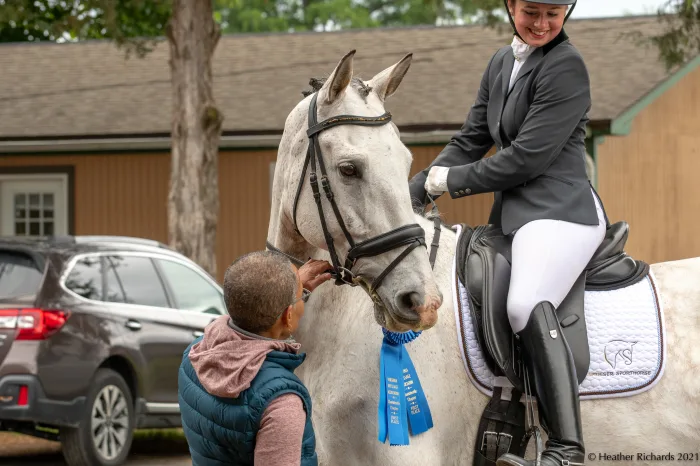Working students come and working students go. It’s the nature of the business, and as much as it stresses me out, I expect it. It’s a job that young people keep for a little while to build a resume, to work their way up to other things. I get it. I did the same thing.
It’s also a job that separates the wheat from the chaff. It’s physical. It’s exhausting. It’s tedious and dirty, and it’s got long hours, and it doesn’t lead itself to a huge social circle outside of the barn, so making friends in a new part of the world can scare some people. Every trainer has a story about hiring some bright young thing only to have them get completely overwhelmed by the job and last only a handful of days.

Sticking out the awkward early days of being a working student leads to opportunities to show client horses. Here, working student Calah Puryear celebrates winning her classes aboard Rhonda Van Lowe’s Escritor HGF. Heather Richards Photo
Summertime is a popular start time for working students, and all over the country young people are graduating from high school or college and making their way to someone’s farm, moving in their stuff and preparing for tomorrow’s full day of work. Here’s a little advice on how to stick it out the awkward early days.
First, the first two weeks of any new job are about figuring out how it all works: who the players are, where the stuff is, what a day looks like. Add in the fact that many barns house their working students together, and you’ll also be figuring out what your fellow working students are like to live with, when they eat, how they live, whether they’re tidy or a mess. It’s a lot to take in, and it’s going to be weird and horrible. Roll with it. Smile. Embrace the inevitable misunderstandings and the general feeling of being completely lost.
And if you’ve been working a desk job or if you’ve been at school, even if you’ve been riding recreationally, prepare to be sore. Have a plan for dealing with the inevitable stiffness, have snacks on hand to keep your energy up, and make sure to get plenty of sleep.
Ask a million questions, and listen to the answers so you don’t have to ask again. Make notes on your phone (or, if you’re old school, write them down on paper) about how things are done that might be different from how you’ve seen them done in other barns.
And on that note: Listen to how your new employer wants things done. Some people like their horses tacked up on crossties with a bridle and the halter, and some like to put the bridle on themselves; some barns sweep the wash stall, and others use the hose to clean it. Even if you think that Activity X should be done one way, if your bosses do it another, then that’s the way you do it. If you want to know why, ask, though sometimes the answer is going to be “because we do it this way,” and that just might have to be enough.
ADVERTISEMENT
Never move empty-handed. There’s a rhythm to the day, and of course there’s a hierarchy of what needs doing, but if you’re heading down the aisle to get a horse, take clean laundry with you. If you’re putting a horse away, take the tack with you to set it aside to be cleaned. It’s amazing how much more you get done when there’s no wasted movement. With that said, plan your day efficiently and wisely. If the mornings are mayhem, set the big projects aside until the afternoon.
Know a few things to do that are good for when everything is done. There will be times where all the mission-critical stuff is behind you. How to fill your time usefully? Folding laundry, sweeping, deep cleaning bridles.
Most importantly, know this: No matter how experienced you are, no matter how many barns you’ve worked in before, embrace that in the beginning, in a new place, not only are you occasionally going to feel like a moron, but people might speak to you like you’re a moron.
When I have a new person in my stable, I don’t yet know how much or how little they know, so I overexplain everything. It’s not because I think my new employee is an idiot; it’s because I’d rather be out ahead of it than set them up for failure. And I don’t yet know how well you ride, so you’re not going to get put on the fancy horses first. That’s an earned opportunity. Prepare to be spoken to like this. Prepare to not get handed the keys to a Grand Prix horse and set off into the wild. Prepare to not be trusted completely right off the bat. Prepare to not know the answers. It’s just gonna be weird for a bit.
And as hard as it may be to spend your time doing menial barn tasks when you have your sights set on being a trainer, out there riding and teaching, remember this: We are so privileged to work in an industry where almost no one is really, truly, authentically good in their 20s. We’re able to go at the international levels until our 50s, 60s and beyond.
Someone I know had a sign up in their barn aisle: “Reiten lernt man durch Kehren.” And it’s true. You’ll be amazed what you can learn while sweeping.
Lauren Sprieser is a USDF gold, silver and bronze medalist making horses and riders to FEI from her farm in Marshall, Virginia. She’s currently developing The Elvis Syndicate’s Guernsey Elvis and her own string of young horses with hopes of one day representing the United States in team competition. Read more about her at SprieserSporthorse.com, or follow Lauren Sprieser on Facebook and Instagram.














